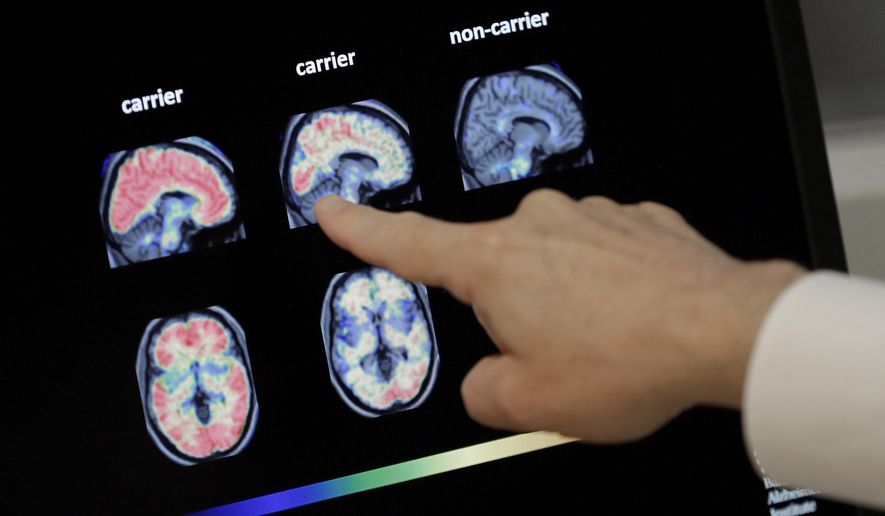Fifteen senators on Monday told Health and Human Services Secretary Xavier Becerra to craft a national strategy to combat Alzheimer’s disease, citing projections that 14 million Americans will combat the neurological degenerative disease by 2050 at a cost of more than $1 trillion per year in federal and out-of-pocket spending.
Sen. Shelley Moore Capito, West Virginia Republican, and 14 senators from both parties said the swiftly aging U.S. population is driving their alarm.
The share of those over 55 years old is increasing at a rate 20 times larger than growth in the collective population under 55, the senators said, foretelling an increase in dementia-related disease.
“We write today to urge you to establish an ambitious national goal to prevent Alzheimer’s disease and related dementias (ADRD) and to develop a plan to achieve this goal,” they told Mr. Becerra. “We believe that reducing the prevalence of dementia should be a priority for the Department of Health and Human Services.”
Alzheimer’s is an irreversible, progressive disease that starts with mild memory loss and worsens over time, making it difficult for its victims to respond to what’s around them or engage in regular activities. It affects as many as 5.1 million Americans, according to HHS.
Both of Mrs. Capito’s parents suffered from the condition.
“Alzheimer’s disease is a deeply personal issue to me, as it is to millions of Americans,” she tweeted. “The administration needs to implement a strategy to prevent and end this disease.”
For years, leaders of the National Institutes of Health and others have warned Congress that it will exact an increasing human and financial toll.
“It will absolutely break our budget if we don’t come up with something,” NIH Director Francis Collins told House lawmakers in 2017.
The Senate group said, in this year alone, Alzheimer’s and other dementia-causing diseases will cost the nation $355 billion, including $239 billion in Medicare and Medicaid payments.
They anticipate a threefold increase in the coming decade, to $1.1 trillion in overall spending (in 2021 dollars) by 2025.
Drugmakers are working on a series of promising drugs, though one recent approval by the Food and Drug Administration was panned over a lack of evidence it is effective and alleged ties between regulators and the industry.
The senators said prevention of any kind will be key.
“A significant percentage of dementia could be delayed — and in some cases prevented — by early intervention,” they said. “In fact, studies indicate that more approximately 40% of dementia cases are potentially preventable by addressing risk factors including hypertension, diabetes, depression, physical inactivity, poor nutrition, smoking, hearing loss, traumatic brain injury, sleep, air pollution and social isolation and loneliness. Many of these factors are also demonstrated risk factors for COVID‐19.”
The senators said the health system is falling short because only 16% of Medicare beneficiaries say they’ve received a cognitive assessment, fewer than half of primary doctors include memory in their protocols, and many physicians don’t promote dementia-reduction strategies.
They said the Centers for Medicaid and Medicaid Services could use their leverage to tie payments to anti-dementia measures.
“Dementia ranks at the top of fears of aging Americans and is on track to triple by 2060. It is the only top-10 cause of death in the U.S. with no known cure,” they wrote. “It is also one of the most urgent health inequities of our time.”
Black Americans are two to three times more likely, while Hispanics are 1.5 times more likely, to have Alzheimer’s disease than non-Hispanic whites, according to the senators. They said by 2030, 4 in 10 persons with the disease will be people of color.
Today, two-thirds of those with Alzheimer’s are women.
The Democrats who joined Mrs. Capito in signing the letter are Sens. Richard Blumenthal of Connecticut, Sherrod Brown of Ohio, Amy Klobuchar and Tina Smith of Minnesota, Edward J. Markey of Massachusetts, Catherine Cortez Masto and Jacky Rosen of Nevada, Robert Menendez of New Jersey, and Debbie Stabenow of Michigan.
The Republican co-signatories are Sens. Kevin Cramer of North Dakota, James Inhofe and James Lankford of Oklahoma, Marco Rubio of Florida, and Roger Wicker of Mississippi.
• Tom Howell Jr. can be reached at thowell@washingtontimes.com.




Please read our comment policy before commenting.